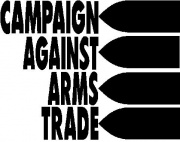Campaigners defiant after disappointing High Court judgment over Saudi Arabia arms sales

On 6 June 2023, the High Court delivered its verdict following a judicial review brought by Campaign Against Arms Trade (CAAT) challenging the Government's decision to renew arms sales to Saudi Arabia. The Court dismissed the grounds for challenge brought by CAAT, finding that the then Secretary of State for International Trade was not acting irrationally in their decision to licence arms sales to the Saudi-led Coalition. This decision related to assessments of the likelihood of violations of International Humanitarian Law (IHL) by the Saudi-led Coalition in Yemen.
Despite being disappointed by the result, CAAT remains defiant over challenging the arms sales. CAAT argues that the judgment exposes the flaws in the UK export licensing process and remains committed to achieving justice for the Yemeni people whose lives have been devastated by the Saudi-led coalition's bombing campaign.
Since the conflict began in 2015, the UK has sold over £25bn of arms to the Saudi-led Coalition. 8,983 civilians have been killed in air strikes on civilian targets by the Coalition, with bomb strikes hitting hospitals, weddings, funerals and key infrastructure. Millions are facing famine and the situation in Yemen has been described as one of the worst humanitarian disasters in the world.
In 2019, CAAT won its case against the government's licensing of arms to the regime on the grounds that the assessment process at the time was "irrational and therefore unlawful". Following this judgment, arms sales were paused and the government reviewed its licensing process, before resuming the sales. CAAT restarted legal proceedings to challenge the process that was put in place.
The new judgment acknowledges that there were lots of choices that the government could have made but it was entitled to use the process it had adopted to resume the sales. In a large number of cases the government dismissed evidence of breaches of International Humanitarian Law (IHL) if the incidents were not subject to a Joint Incidents Assessment Team (JIAT) report by the Saudi-led Coalition. This is despite evidence provided to the court that JIAT reports are flawed and not impartial. This leeway also meant that the government was allowed to prioritise diplomacy over human lives when deciding how far it wanted to push Saudi Arabia for details of potential IHL violations.
CAAT's media spokesperson, Emily Apple, stated: "While we are obviously disappointed with the verdict, we are particularly disappointed for the Yemeni people whose lives have been devastated by UK licensed bombs. The court's ruling, much of which was based on closed evidence that we were not allowed to hear, exposes the low threshold the government has to reach in order to sell weapons to regimes committing human rights violations.
"This judgment has exposed the fact that the government's arms export licensing regime is incredibly permissive. Stronger export controls are needed that prioritise people's lives over arms dealer's profits. We must not allow the atrocities that the UK government contributed to in Yemen to happen again.
"Moreover, this is not the end of our fight for justice for the Yemini people. While we welcome the ongoing peace process to end the conflict, a lasting and just peace depends on recognition and reparations for the role that the UK and other Western countries have played in prolonging and aggravating the conflict.
"Time and again, the government and British arms companies prioritise profit over people's lives. This verdict only strengthens our determination to continue finding ways to challenge these sales and ensure that this trade in death and destruction is stopped for good".
GLAN, the lawyers who represented Mwatana, the Yemeni human rights organisation that intervened in the case said: "Our clients, Mwatana, provided the government with first-hand evidence of airstrikes that killed scores of civilians. Instead of listening to them, the government went ahead and licensed yet more weapons to Saudi Arabia. The decision of the Court to endorse such decisions is extremely demoralising and we send our solidarity to the families of those killed by the Coalition with the help of the United Kingdom."
Martin Butcher, Peace, Conflict and IHL Policy Advisor for Oxfam, said: "Today's judgment from the High Court is terrible news. More than four armed attacks on civilians were carried out daily during 14 months of the war in Yemen. British arms sales have fuelled a war that has left more than two thirds of the population in need of humanitarian assistance. It is difficult to understand how the High Court has found that possible breaches of International Humanitarian Law were "very few". The people of Yemen will ultimately pay the price."
LINKS
CAAT report: UK Arms to Saudi Arabia - https://caat.org.uk/homepage/stop-arming-saudi-arabia/uk-arms-to-saudi-arabia/
Oxfam report: Fueling Conflict: Analyzing the human impact of the war in Yemen - https://oi-files-d8-prod.s3.eu-west-2.amazonaws.com/s3fs-public/2023-01/Fueling%20Conflict%20-%20English%20Paper.pdf


















